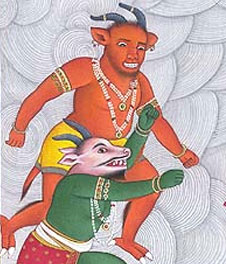|
|
Using Philosophy in
|
|
|
|||||||||
|
|
| |||||||
|
|||||||||||||||
| |||||||||||||||

Above:
Hindu
Painting, with allusions to hell and life after death.
Commentary
Is our existence purely earthly?
What happens to us after we die? Do we simply cease to exist? If a man dies, will he live again? (Job 14, 14).
Democritus and Epicurus were two of the few great ancient philosophers who clearly said “yes”. To them, and to the ancient materialists, the soul and the sensations were part of the body, and disappeared with it. «Death is nothing to us; for once the body is dissolved into its elements, there will be no sensations, and that which has no sensation is nothing to us» (Epicurus).
Lucrecius, a disciple of Epicurus, is extremely radical on this point. To him there isn’t a soul without a body, and hell and the fear of god’s punishment is a stupid belief: «All those things told in fables about the land beyond the grave are here, in our life on earth. (…) It’s here, in life, that the empty fear of the gods threatens mortals.»
Curiously, in the Old Testament there are also clear signals of doubts about the soul’s immortality: «All go to one place. All born from the dust, and all turn to dust again». «Who knows the spirit of man, whether it goes upward, and the spirit of the animal, whether it goes downward to the earth?» (Ecclesiastes).
But these are clearly marginal positions. In all societies and cultures, the largely dominant position has always been belief in the immortality of the human soul. Authors such as Dostoyevsky postulated that social life would be impossible without the collective creed in immortality: «If you were to destroy in mankind the belief in immortality, not only love but every living force maintaining the life of the world would at once be dried up».
Christianity only deepened and formalized the profound human creed in the denial of death. «I am the resurrection and the life. Those who believe in me, even though they die like everyone else, will live again. They are given eternal life for believing in me and will never perish...» (Jesus in John 11:25-26).
In the Middle Ages and the Renaissance, the doubt wasn’t as much in our immortality, and in the existence of a life beyond our mortal life, but in the nature of heaven, and in the rewards and punishments waiting those who left the earthly existence.
Some mystics have given voice to what was written in the Bible, in the Corinthians: «No eye has seen, no ear has heard, and no mind has imagined what God has prepared for those who love him». That’s the case of John Donne, in the eighteenth century: The «Dead shall awake as Jacob did (…) And through the gate of heaven they shall enter, and in that house they shall dwell, where there shall be no Cloud nor Sun, no darkness nor dazzling, but one equal light, no noise nor silence, but one equal music, no fear nor hopes, but one equal possession, no foes nor friends, but one equal communion and identity, no ends nor beginnings but one equal eternity.»
Yet some obstinate questions remain. How to conceive life after-death? The Bible, in Corinthians, puts the problem: «But someone will say: How are the dead raised, and with what kind of body do they come?»
Does punishment exist in life after death? Do evil people become good, denying what they were? Are only the good resurrected to enjoy immortality? And hell, does it exist?
The answers are obviously very divergent, even on the Christian side. To some fundamentalist theologians, hell is unavoidable. «The absence of hell would be an extreme of injustice, because it would be to concede the same end to Saint Vincent de Paul and Marat, Judas, Nero or Messalina. The last four are already there, undoubtedly. To replace hell by purgatory would also be very unjust», said an outstanding French priest of the nineteenth century.
But one can argue against this. Divine good presupposes forgiveness and conciliation. The continuity and the transposition of vices and earthly situations don’t make sense. We can postulate that it’s wrong to give too much importance to human wickedness and crimes.
That’s what the words of Compte-Sponville suggest: «All sins, of course, deserve to be treated with mercy: we all do what we can, and life is too hard and too cruel for us to condemn anyone for failing in this area. Does anyone know what he himself would do if faced with the worst and how much truth could he bear under such circumstances?»
Copyright Eduardo Reisinho & MeaningsOfLife.com.
All Rights Reserved.